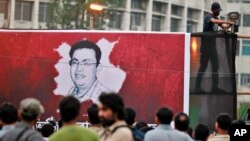Like many other countries in the world, Bangladesh faces the threat of violent extremism.
In Bangladesh, U.S. Under Secretary of State for Civilian Security, Democracy, and Human Rights Sarah Sewall said, “groups like the [Jamaat-ul-Mujahideen Bangladesh] have long targeted innocent people in movie theaters, political gatherings, and New Year’s celebrations.” Recently, “extremists stabbed a man to death in Kurigram, because he converted to a new faith. This follows recent attacks against Shia Muslims, Hindus, and Christians. In the last few years, four bloggers have been murdered in cold blood. Bloggers like Avijit Roy, who was hacked to death at a book fair right here in Dhaka. These barbaric acts are not just attacks on the Bangladeshi people, but also their long tradition of open debate, religious tolerance, and moderation.”
Governments have an important role to play beyond deploying armies and police to protect people from extremist threats. Governments must govern justly and not use the fight against terrorism to undermine democracy and the rule of law by allowing detentions, excessive force, or restrictions on political space. These kinds of actions can actually drive people toward extremism, said Under Secretary Sewall.
But governments cannot do it alone. Countering violent extremism requires empowering people, including religious leaders, women, businesses, and young people.
But in order to unleash the talents of individuals in the fight against violent extremism, freedom of speech must be protected. As Under Secretary Sewall said, this includes “protecting their fundamental freedoms to peacefully speak out, practice their faith or not practice one, and to organize on behalf of their beliefs. These are universal human rights; but they are also sources of resilience against violent extremism.”
When people are free to speak without reprisal about corruption, or abuse by local police forces, or feelings of marginalization, they can alert governments to address potential dangers of radicalization before they grow.
In the face of violent extremism, said Under Secretary Sewall, “I have no doubt that the people of Bangladesh will prevail if they stay true to their deepest traditions – of inclusion, democracy, and trusting in the power of people.”




